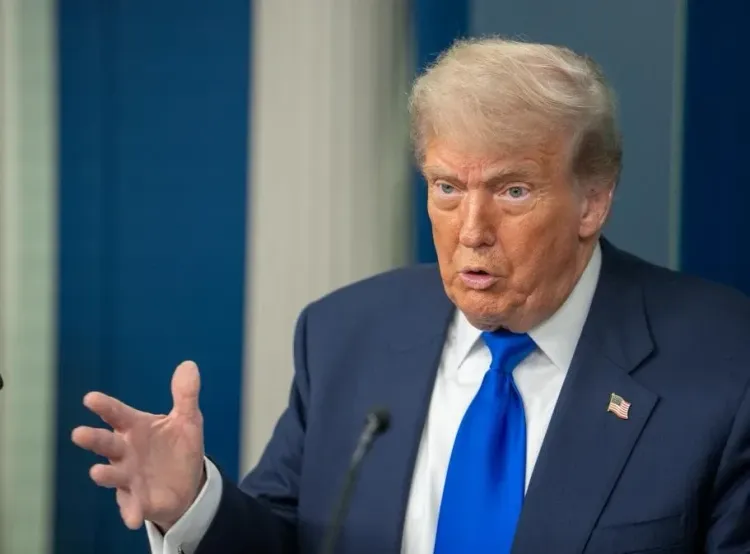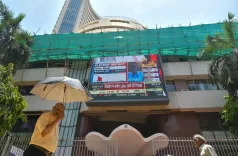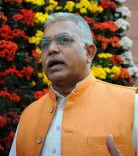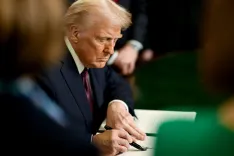Did the US Supreme Court Just Limit Injunctions Against Trump's Birthright Citizenship Order?

Synopsis
Key Takeaways
- The Supreme Court's ruling limits the judiciary's power to issue nationwide injunctions.
- The decision reflects a significant shift of authority towards the executive branch.
- Trump's executive order on birthright citizenship has faced immediate legal challenges from states and civil rights groups.
- The implications of this ruling could impact immigrant rights and citizenship definitions.
- Ongoing legal actions are expected in response to the ruling.
Washington, June 28 (NationPress) The US Supreme Court has determined that district judges do not possess the authority to issue nationwide injunctions against the executive order from the Trump administration that aims to effectively terminate birthright citizenship.
In a ruling that split 6-3 along ideological lines, the Supreme Court justices granted a request from the Trump administration to restrict the reach of nationwide injunctions imposed by district judges, as reported by Xinhua news agency.
Justice Amy Coney Barrett, writing for the majority, stated, "Federal courts do not exercise general oversight of the Executive Branch," emphasizing that "When a court finds that the executive branch has acted unlawfully, the solution is not for the court to overstep its own authority."
However, the three liberal justices dissented from this decision.
Justice Sonia Sotomayor remarked, "Children born in the United States and subject to its laws are United States citizens," asserting that this has been the legal standard since the nation’s inception.
Sotomayor further criticized the majority's focus, claiming, "The gamesmanship in this request is clear, and the Government does not attempt to disguise it." She pointed out that the majority completely overlooks the constitutionality of the President's Executive Order, concentrating solely on whether federal courts have the authority to issue universal injunctions.
The Trump administration expressed swift approval of the Supreme Court's ruling.
President Donald Trump termed the decision a "giant win" in a post on Truth Social, later declaring at the White House that the decision is a "monumental victory for the Constitution."
Vice President JD Vance added in a post on X, "A huge ruling by the Supreme Court, putting an end to the absurd process of nationwide injunctions. Under our legal system, everyone must obey the law -- including judges!"
US Attorney General Pam Bondi stated in a post on X that the Supreme Court "has instructed district courts to STOP the endless barrage of nationwide injunctions against President Trump." She affirmed that the US Department of Justice will continue to "vigorously defend" Trump's policies and authority.
In a press conference with representatives from several organizations that sued to block Trump's executive order on birthright citizenship, the groups announced the filing of a class action lawsuit and a motion for a temporary restraining order to continue blocking the executive order, according to NBC News.
William Powell, senior counsel for the Institute for Constitutional Advocacy and Protection, explained the rationale behind filing a new motion and class action, stating, "What the Supreme Court's decision implies is that we must seek to have that order invalidated through different procedures."
Conchita Cruz, co-founder and co-executive director of the Asylum Seeker Advocacy Project, was quoted by NBC News, saying, "It is a confusing moment for immigrant families as they see the news and are not clear on its implications or how it may affect them."
"We are outraged -- and we will not back down. Immigrants and their families deserve protection, dignity, and justice. We will keep advocating for our rights," stated the National Latina Institute for Reproductive Justice, representing the Latina community, in a post on X.
A senior legal analyst noted in a CNN report that the Supreme Court's ruling to support Trump's efforts to limit lower court orders has "fundamentally shifted power away from the courts to the presidency."
Elie Honig, a former state and federal prosecutor, remarked that it is now "more challenging" for plaintiffs seeking to contest Trump’s policies.
Trump enacted the order just hours after assuming office on January 20, which directed federal agencies to cease recognizing citizenship for children born after February 19 if neither parent is a US citizen or permanent resident.
Over 20 states and civil rights organizations quickly launched lawsuits against the order, labeling it overtly "unconstitutional."
The 14th Amendment of the US Constitution states that "all persons born or naturalized in the United States, and subject to the jurisdiction thereof, are citizens of the United States." Trump's executive order contended that the 14th Amendment "has always" excluded from birthright citizenship individuals born in the US who were not "subject to the jurisdiction thereof."
Federal judges in Washington, Maryland, and Massachusetts had issued nationwide injunctions halting the execution of Trump's executive order.








